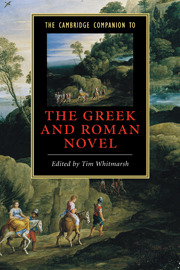14 - Narrative
from Part III - Form
Published online by Cambridge University Press: 28 June 2008
Summary
Narrative is now a permanent fixture in modern criticism on the Greek novel. Under the pervasive influence of narratology, popularised particularly by Gérard Genette and Mieke Bal, concepts such as 'embedded narrative', 'narratees' and 'focalisation' (these terms will be glossed in the course of my discussion) have become a familiar part of the armoury of literary theory. This chapter has no pretensions towards recapitulation of the standard formal analysis of the narrative structure of the novels, for which the reader can consult works that are readily available. Instead, it seeks to show how a grasp of narrative and narrative theory can offer a sharply defined critical vocabulary permitting a subtler grasp of wider issues of literary and cultural interpretation. Novels, after all, specifically challenge their readers to decode a variety of types of speech, assembled more or less loosely into a single framework. At one level, the issue is one of genres: the Greek novels allude to a staggering range of different literary forms, from epic, lyric and drama through historiography and philosophy to oral narrative. More than this, however, they also incorporate a variety of different perspectives upon the world, and strategies for understanding it.
- Type
- Chapter
- Information
- The Cambridge Companion to the Greek and Roman Novel , pp. 237 - 258Publisher: Cambridge University PressPrint publication year: 2008
- 3
- Cited by

